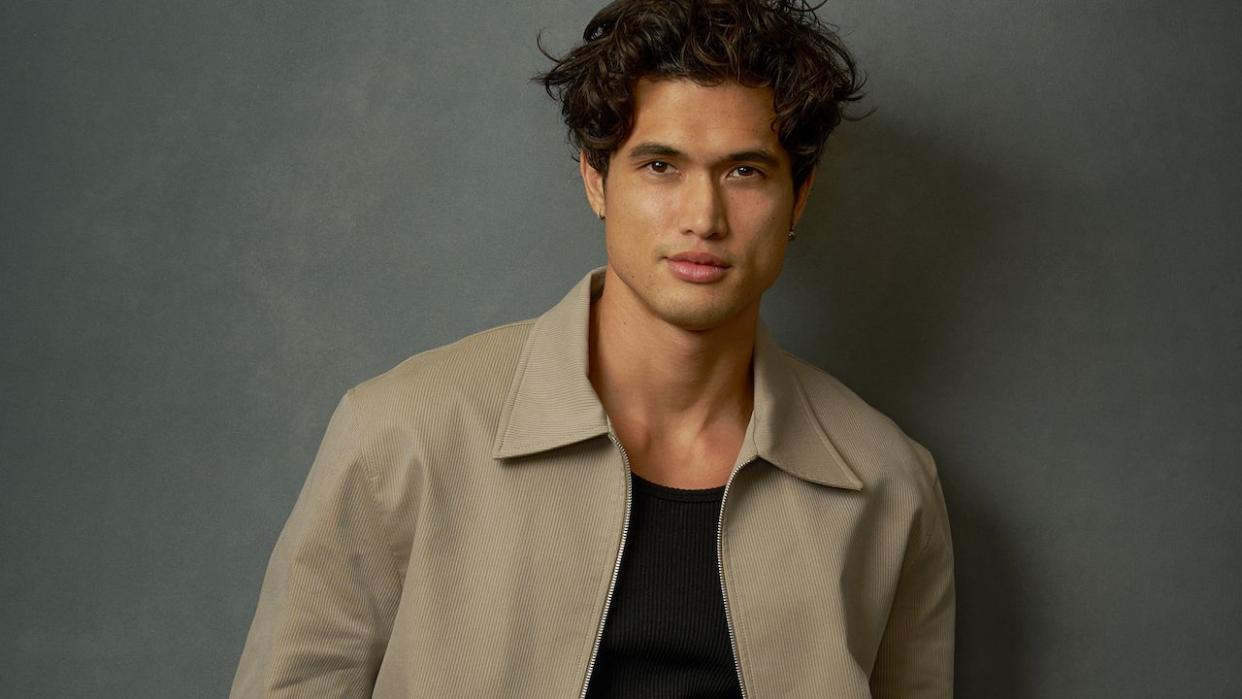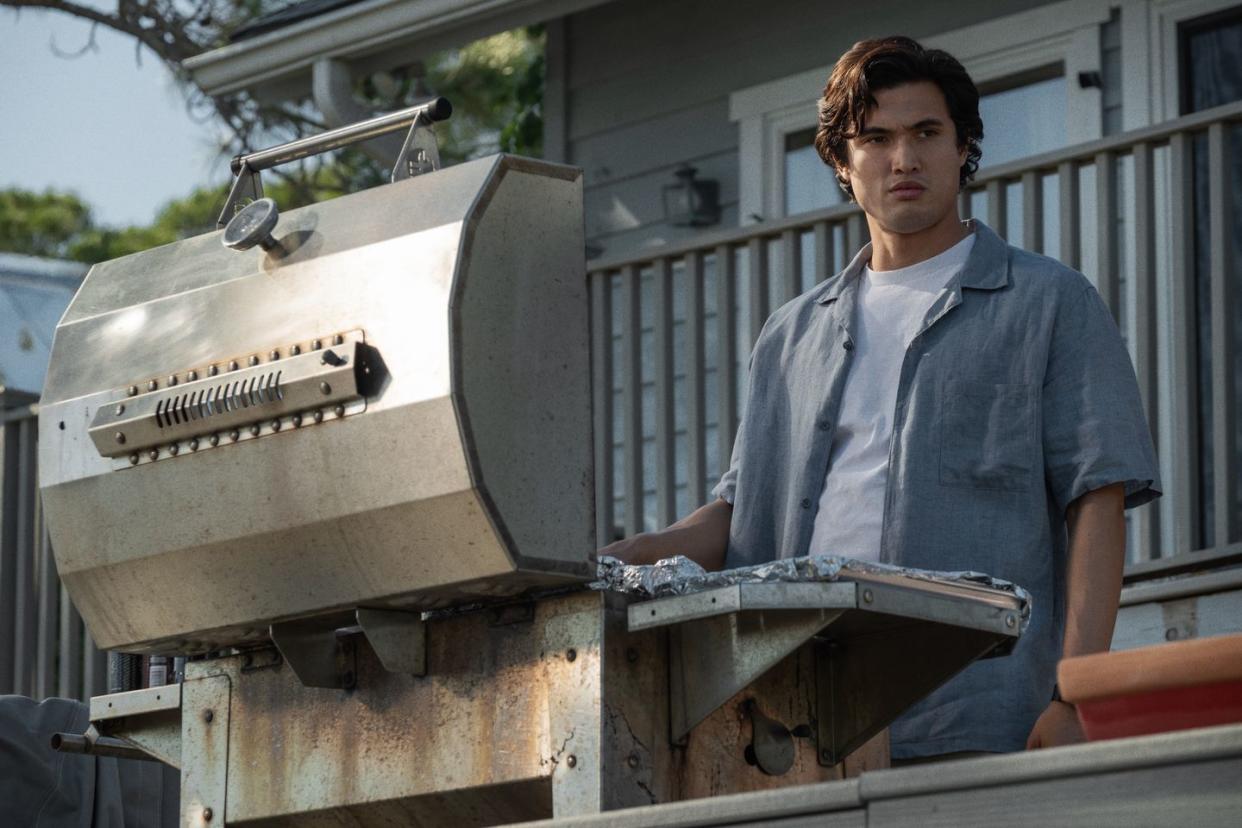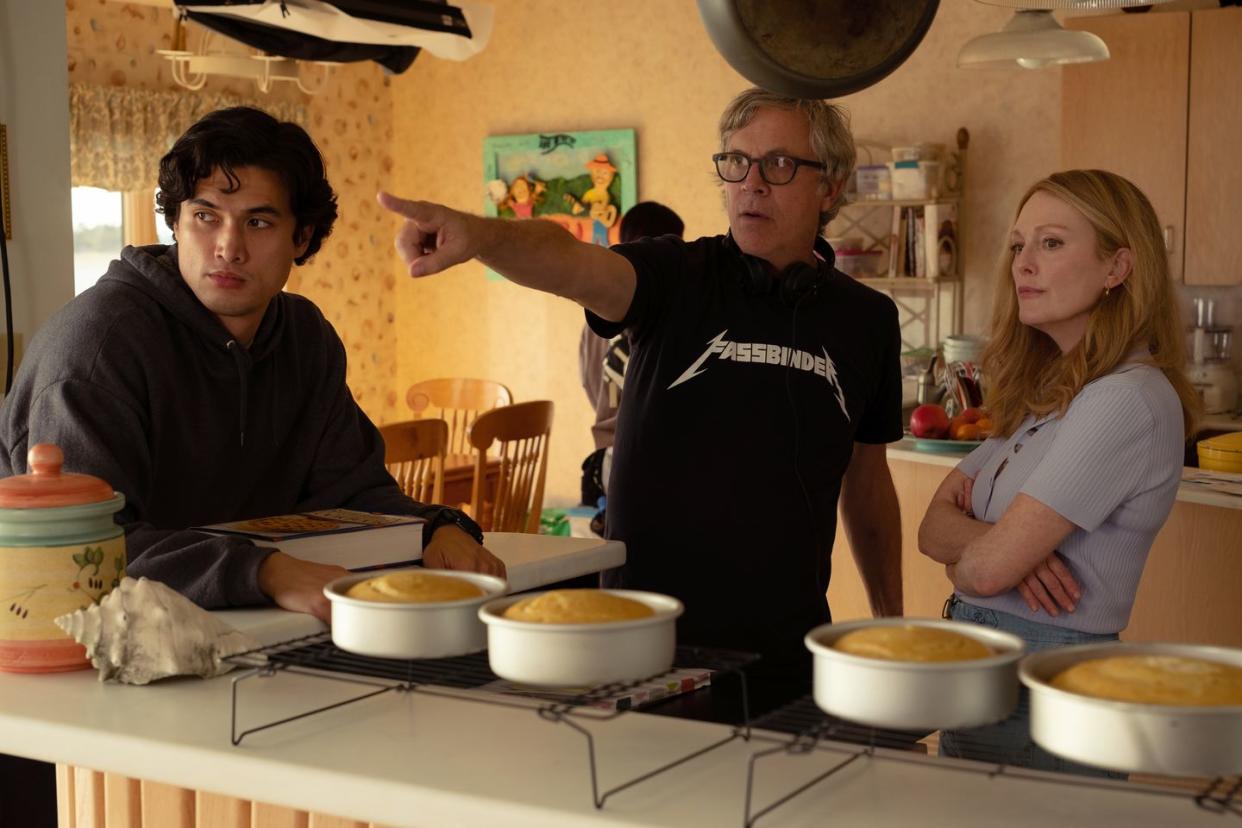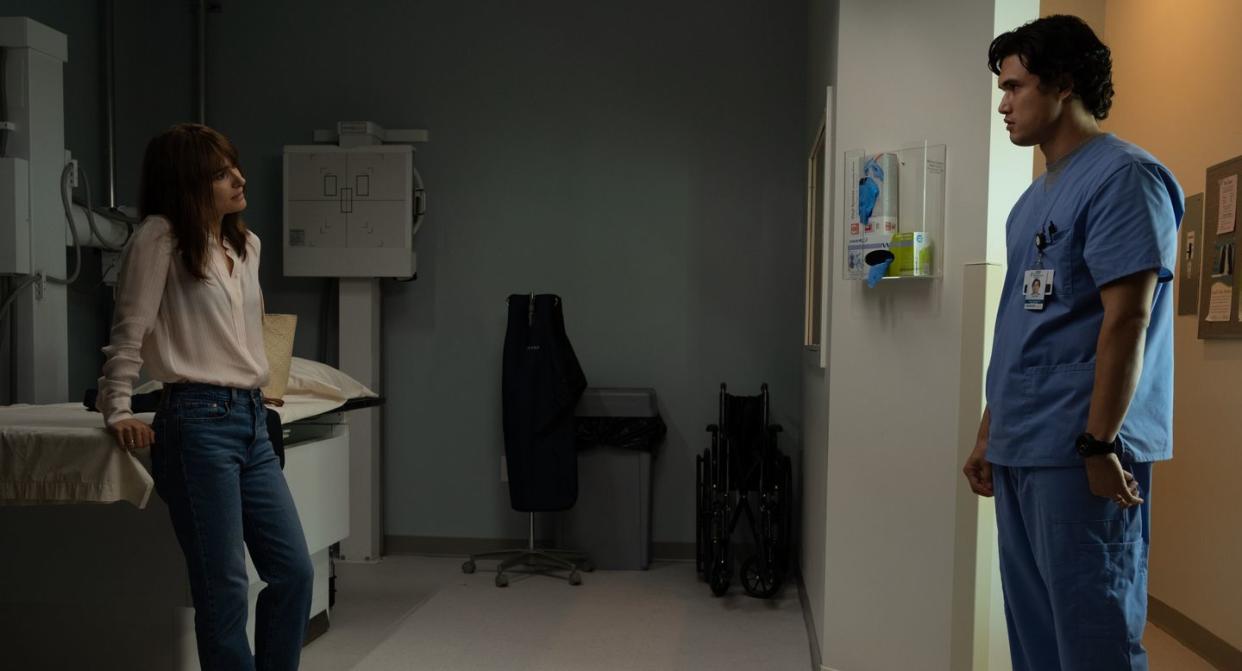How Charles Melton Beat the Odds

Charles Melton sent me kimchi. The day before we are due to speak for this interview, a small package arrives at my home. In it is a mason jar filled to the brim with homemade fermented cabbage, accompanied by a handwritten note that reads: “My grandmother’s recipe has been in our family for over six decades. I hope you enjoy. —Charles Melton.” I am aghast, mainly because no one in Hollywood does this.
When we meet the next day, it takes no more than about 30 seconds for Melton to show me around his house. He has a printing station behind him that is home to his cameras and painting supplies. He gets up from his desk with his laptop, so I can see his new cold plunge tub, which being installed outside. He proudly points out his sister Tammy, who is visiting. I shout hello.
Melton is easily recognizable to a certain generation from the seven seasons he spent playing Reggie Mantle on the CW’s Riverdale, a dark and wildly popular teen series based on the characters from Archie Comics. But this winter, he is pivoting just a bit.
He performs alongside Julianne Moore and Natalie Portman in Todd Haynes’s lauded new film May December. It’s a loose adaptation of the true story of elementary school teacher Mary Kay Letourneau and sixth grader Vili Fualaau, whose sexual relationship dominated the tabloids, airwaves, and water-cooler conversations of the late 1990s. Melton stars as Joe Yoo, who at 13 years old became entangled in an affair with Gracie Atherton (Moore), the manager of the pet shop where he worked. Two decades, a marriage, and two children later, in a town where much of the past seems to be forgotten, the story simmers to the surface again when movie star Elizabeth Berry (Portman) comes to town to research the family as she prepares to play Gracie in an upcoming biopic.
It’s a twisted, heartbreaking tale of abuse, manipulation, family, and self-realization—and since May December’s release on Netflix in December, critics and audiences alike have had their eyes on Melton’s standout performance. As we discuss his breakout role, the new film, and this seemingly seminal moment in his career and life, I find myself hoping the actor holds on to the part of himself that sends kimchi to strangers, as I’m certain this is just the beginning of a long ride.
You’ve had a pretty wild few months, and it’s all so deserved. Did you ever think you’d be sitting here, where you are right now?
No, I did not. It’s amazing, because a little over a year ago is when we finished filming [May December] in Savannah, Georgia. Small budget, small indie filmmaking. Todd Haynes, 23 days, completely just enveloped in my character and the whole experience. And what’s funny is, after I filmed for 23 days, I had a month in between before I had to go back to Riverdale to finish our last season. I went from playing a 36-year-old dad to … a 16-year-old high schooler. It was one thing after the next—before the show ending, it was the Cannes Film Festival. Then the show ending, then that Netflix acquired May December, and then we were in a strike. Everything’s happened very fast, but there’s just so much gratitude.
Since the story is loosely based on something that actually happened—a situation that was also nuanced, and tragic, and heartbreaking—did you feel a great deal of responsibility to really get it right?
I don’t think it’s ever about getting it right. I just knew when I first read the script, I was like, I think I know who this guy is. I think I have some understanding of my own personal ideas and experiences of repression, loneliness, wanting to feel small, making myself feel small, and not taking up space, and feeling other than. There are so many different layers that the material of Samy Burch’s script provided for me to explore. The fun part is, how can I maintain some balance in my own life in order to tell this character’s life?
Because yes, it is a lot. The material is heavy, but the material was just such a specific, vast blueprint of storytelling of all these characters, and especially with Joe. I would do things to relax myself. Acupuncture, to relax my body, so I can really hold the tension or the weight of whatever Joe was feeling internally. I would do things, find comfort in anime, Abbott Elementary. I would do a lot of things, as far as the technicalities. The technical approach of how I work as an athlete is very similar to how I work as an actor.
Can you explain that a bit more?
Practice makes perfect, but it’s not so much repetition of the words, but existing in my character’s own humanity while I’m by myself in my own home or running errands. Just walking like my character, and just seeing how that existence is perceived by certain people or whatnot, or just doing things intrinsically on my own and practicing. So that when I did come to set, it was really just easy. There’s almost an affirmation in the … preparation. I just did heavy preparation. I just went really deep.

Your relationship with Julianne Moore as Gracie particularly feels really lived-in. Between the chemistry reads and you getting the part, and your arrival in Savannah, did you two prepare together or spend time together? Or was it just showing up and figuring it out as you went?
I think that’s just a testament to, really, Todd Haynes, our director. He has such a point of view and really created this space and the environment for us to really completely let go. We didn’t have rehearsal time. We had 23 days.
We got a couple of dinners together leading up to shooting, but we really more so connected on a human level, as individuals. We talked a little bit about the script and everything, but we didn’t have time to rehearse. We had complete trust in Todd, and we all came so prepared, and Todd is so prepared.
I call Julie, Natalie, and Todd a trifecta of excellence. They just elevate everything around them. And to be able to show up and have Todd telling you to trust in your instincts, and that I showed him who Joe is and was—that’s one of the best of many encouragements that I got from Todd that really allowed me to really let go throughout the whole process.
Beyond just learning by osmosis or being with Natalie and Julianne on set, was there anything that you felt like you really learned from them that you can put words to?
I learned with them really early on to let go of ideas. I always had this concept that I had to suffer for my character, and that an actor has to suffer for their character, but you don’t. It’s not your job to suffer for your character. Your job is to tell your character’s story, to maybe hold them in some sort of sense. You can still be enveloped, but to hold them in a caretaking sense to tell their story—not to allow their story to run rampant in your own personal life, to where you’re losing [your] sense of reality. I don’t really believe in that.
Something I found so interesting about Joe was his duality. He’s gone through so many things in his young life that people twice his age will never go through, and yet he is also so innocent in so many ways. I don’t know if this goes back to preparation, but you embodied him so deeply. How do you play both sides?
I’m sure there’s someone in the world or someone has heard [something like] “Oh, you’re not an adult until you start paying a mortgage. You’re not an adult until you get married, or you get a degree, or you have a job.” Or “You’re not an adult until you have kids,” or whatnot. There’s all these concepts of “This is what signifies you as being an adult.” Joe’s adolescence was taken from him because he had to become a father at 13. In a way, that freezes his adolescence. It’s this arrested development, where he is then conditioned by this moment of responsibility, and of this life of being a father, while navigating through tabloid culture at the time, probing through his life.
Joe had to create this adaptive adult child. I think he assimilated to a lot of these roles and really put all these things before himself—his family, his kids, his marriage, being a provider, a loving father—where he became secondary always to everything that he was doing. It really made me think about a kid who puts on a shoe that’s too big—the responsibility. The kid’s going to eventually grow into that shoe later.
Just understanding that the emotional makeup of this character, Joe, and what he experienced, can live in the body in a different way. I really never thought about it as this child likeness. I just thought of the social construct of how he navigates in order to survive and not take up space. He’s very preverbal. His body speaks for himself before he can articulate. It was just fascinating to really dive into with my coaches that I work with—and my therapist. It was really fun.

There’s a scene where Joe is in the bedroom with Gracie, and it feels like he finally summons the words for what the audience presumes is the first time he’s ever said anything like that out loud. Where do you think that courage comes from for him, if you want to call it courage? It seemed like that to me, but I don’t know.
No, it is courage. He’s walking on eggshells. We see throughout the film, Joe reliving what happened to him when he was a 13-year-old boy with Gracie, except now with Elizabeth. And the scene prior to that scene where he confronts Gracie, he jumps into bed after he has that moment with Elizabeth, and he’s like, “Okay, what’s next?” And people are laughing, but it’s heartbreaking, because he’s just been manipulated, taken advantage of … He thinks maybe he’s in love or he’s got a new girlfriend. He doesn’t know, but we feel so bad for him. He’s so earnest.
And Elizabeth says, “This is just what adults do,” which is a form of honesty maybe he never got from Gracie. And then we see him go home and we see Joe look at himself for the first time. There’s no performance to Joe. There’s no performance art. He doesn’t even know what he’s performing, but he sees himself.
I remember thinking maybe these are the seeds of him being able to have a life that’s not this, if he wants it. Maybe there’s something for him afterward.
There is hopefulness in the graduation scene—the unknown of his kids experiencing a part of life he didn’t get to quite experience, but there’s a joy in the unknown. He can start over, but what does starting over look like? That doesn’t mean completely abandoning his life or abandoning his kids. No, it’s just a new—
He’s not that person.
He’s not that person. There are so many different metamorphoses in life where you’re transitioning from one chapter to the next. You get engaged, you get married, you graduate high school, you graduate middle school, you see your kid take their first steps, you get a promotion at a job. There are so many metamorphoses, and it’s just like: How do we respond to them? Are we afraid? And Joe’s not afraid of it. I think he’s open to it.

To move a little bit away from the seriousness of it all, I also read that you gained 40 pounds to play Joe, and that you enjoyed that part of the process. Please tell me what you ate.
I ate a lot. I ate ice cream, pizza, popcorn on top with pizza, popcorn with Milk Duds. I drank Fanta, Dr Pepper. I had Five Guys every night—triple cheeseburgers with bacon, a large Cajun fry, two nacho cheese hot dogs. It was amazing.
While you’ve been out and about promoting this film, it’s evident how much you love your family and have really involved them in the process. How has it been to share this with them, and what do they make of all of it? Do they think it’s insane? Do they keep you humble? Do they love going out and dressing up? What’s the deal?
All of that. My sister works with me—she’s my producing partner and helps me manage my life. She keeps me humble. They all keep me humble. At the end of the day, the only people I have are my family and my loved ones. That’s it. The people that are always going to speak truth to me, no matter what. They will be with me in all the moments, not just this moment.
If you don’t get to share it all, what’s the point?
What’s the point? I don’t think [there would be] any point. And seeing my parents get excited, usually more excited than me about certain things, makes me available to be more excited then, because I’m watching my mom freak out or tell everybody in the Korean church in Kansas. It just makes me happy.
This interview has been edited and condensed for clarity.
You Might Also Like
